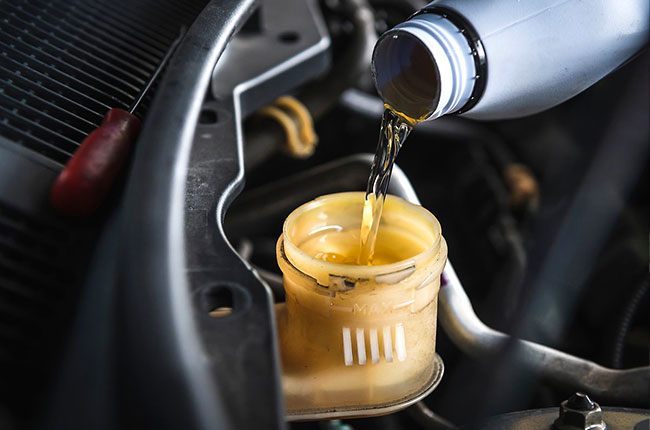

At Luke’s Auto Service, the safety of our customers is our top priority. Your brakes are one of the most critical components of your vehicle’s safety system. We have previously talked about how there is no such thing as a “one size fits all” when it comes to brake pads and rotors in our “Breaking Down” The Basic Facts on Brakes blog. But one often overlooked aspect of brake maintenance is the brake fluid. In this blog post, we’ll discuss how often you need to change your brake fluid and why it’s essential.
What is Brake Fluid and What Does it Do?
Brake fluid is a type of hydraulic fluid that is used in the brake system of your vehicle. When you press the brake pedal, it creates pressure in the brake lines that activates the brake calipers. They then squeeze the brake pads against the rotors, slowing or stopping the vehicle. Brake fluid is a critical component of your vehicle’s safety system, and without it, your brakes would not function properly.
There are several different types of brake fluid. The most common types used in vehicles today are DOT 3, DOT 4, and DOT 5.1. Each type has a different boiling point and viscosity, which makes them suitable for different types of vehicles and driving conditions.
Over time, brake fluid absorbs moisture, which lowers its boiling point and can cause corrosion within the brake system. This can lead to a loss of braking power, brake fade, or even a total brake failure. This is why it’s important to change your brake fluid regularly. By doing so, you can help ensure that your brake system is functioning at its best and that you and your passengers stay safe on the road.
How Often Should You Change Your Brake Fluid?
The answer depends on the make and model of your car, as well as your driving habits. As a general rule of thumb, brake fluid should be changed every two years or 30,000 miles, whichever comes first. However, if you frequently drive in stop-and-go traffic or live in a hilly area, you may need to change it more often.
Why is Changing Your Brake Fluid On Time Important?
Brake fade is dangerous as it can lead to longer stopping distances and even brake failure in extreme cases. By changing your brake fluid regularly, you can help prevent brake fade and ensure that your brakes are working at their best.
As brake fluid absorbs moisture, it can also cause corrosion within the brake system. This corrosion can damage components such as the master cylinder and brake calipers, leading to expensive repairs down the line. By changing your brake fluid regularly, you can help prevent corrosion and extend the life of your brake system.
Signs it May Be Time to Have Your Brake Fluid Changed
Here are a few signs that it may be time to have your brake fluid changed:
- Your brakes feel spongy or less responsive than usual. This indicates that there may be air in the brake lines or that the brake fluid is contaminated.
- You notice a change in the color of your brake fluid – it should be clear or slightly yellow.
- Your vehicle pulls to one side when you apply the brakes. This could indicate that your brake calipers are sticking, or that your brake fluid is contaminated.
- You notice a burning smell when you apply the brakes. This could be a sign that your brake fluid is overheating, which can cause brake fade and other issues.
Changing your brake fluid is an important aspect of brake maintenance and is often overlooked. By having it changed regularly, you can help prevent costly brake repairs down the line and ensure that your brakes are working at their best. If you’re unsure when your brake fluid was last changed or are experiencing any issues with your brakes, don’t hesitate to bring your car to Luke’s Auto Service in Verona, NJ. We are dedicated to helping our customers stay safe on the road!
Images:
